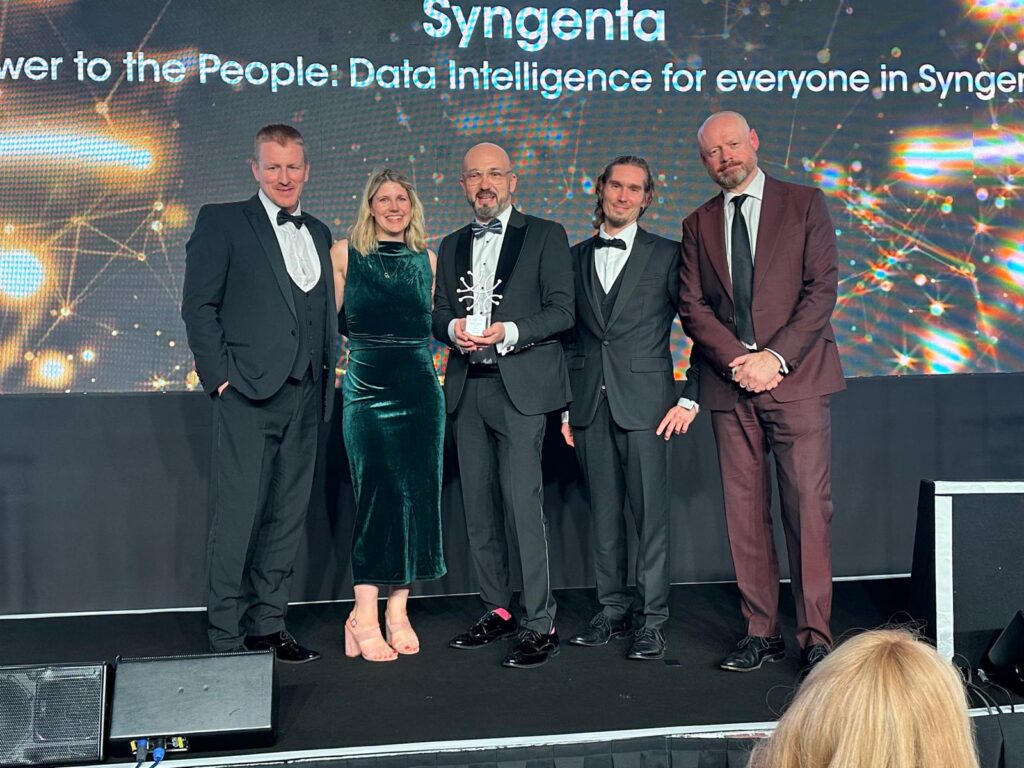As one of the world’s leading agricultural technology companies, Syngenta plays a critical role in protecting and enhancing crops that underpin the global food chain. But until recently, its R&D data landscape was fragmented and inefficient, with data sat in siloes, designed for single applications rather than re-use. Scientists spent months just navigating systems before they could begin meaningful analysis. Meanwhile, data literacy across the organisation was inconsistent, limiting the ability to fully exploit new digital and AI tools.
Without a step change in how data was managed and shared, the risk was clear: digital transformation would falter, and the pace of discovery would slow at precisely the moment agriculture needs innovation most.
“This was a strong presentation with good level of detail and metrics and easy to read… It looks like it has a good societal impact for those wider grower communities.” – Judges’ comments
Two-Pronged Solution
Syngenta’s Crop Protection R&D team designed a bold two-pronged strategy: build a state-of-the-art data platform and invest in people through large-scale upskilling.
- Gaia, the Data Platform: Named after the Greek goddess of Earth, Gaia is a modern, AWS-powered platform built with SnapLogic and Databricks. It underpins a true data mesh, where decentralised domain leads manage and publish data as products. Gaia enables robust pipelines, AI-ready datasets, and seamless access for both human and machine users.
- Digital Growth Academy (DGA): To complement the technology, Syngenta launched a data literacy programme accredited by the Open Data Institute. Structured around five data personas (Citizen, Creator, Integrator, Expert, Leader), the academy offers bespoke pathways, from fundamentals to advanced skills. Hackathons, development days and technical courses reinforce a culture captured in the acronym CODE: Curious, Open, Data-centric, Empowered.
Within just a year of launch, Gaia has transformed how R&D operates:
- 180 monitored data pipelines and robust products across five domains.
- 210 self-serve power users spanning engineering, science, and analytics.
- 15+ BI, AI/ML and data science apps already in production.
- 60% faster time-to-value, saving hundreds of days and reducing compute costs by a third.
At the same time, the DGA has reached scale:
- 2,100 learners across 65 countries have completed Data Fundamentals.
- Over 1,200 colleagues engaged in hackathons and digital development days.
- Forty scientists are being upskilled as Gaia power users.
- Feedback has been overwhelmingly positive, with a median net promoter score of 6/7.
Perhaps most telling, Gaia and the DGA are now being adapted by other business units across Syngenta’s 60,000-strong global workforce.
A Model for Sustainable Transformation
Judges noted that Syngenta’s approach exemplifies new ways of working with data: combining modern architecture with cultural change, and ensuring tools and training evolve together. This is not transformation imposed from above, but a carefully designed ecosystem that empowers scientists to act with speed and confidence.
By embedding Gaia and the DGA at the heart of R&D, Syngenta has delivered a repeatable model for data-driven transformation. It has created the conditions for faster, more resilient agricultural innovation, putting better products into the hands of millions of growers worldwide.





